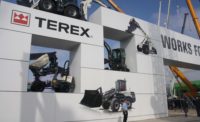Terex Corp. wants to bring the Demag brand back together while moving away from the cyclical construction sector.

The Westport, Conn.-based equipment manufacturer announced on May 2 that it is offering $1.3 billion in cash to the shareholders of Dusseldorf, Germany-based Demag Cranes AG, and will assume its debt, pension and other obligations, for a takeover worth approximately $1.5 billion.
Terex seeks to acquire Demag’s line of overhead and shipyard cranes to gain more exposure into the industrial sector and minimize its presence in construction. The deal would create for Terex a global port-equipment franchise and smooth out the cycles associated with its line of traditional construction machinery, the company says.
Timing is another reason, as the deal is expected to generate cash quickly. “We are at the beginning of an economic cycle, and certainly nowhere near the end as we see it,” said Terex Chairman and CEO Ron DeFeo in a May 2 conference call with investors.
However, the hostile bid is not a sure thing. Terex confirms it has tried, unsuccessfully, to reach out to Demag executives directly for months and has received no response. Demag has not responded other that to say that it has seen the offer.
If successful, Terex would reunite a global crane business that originated long ago, in 1819, as a machine-tool shop in Germany. Terex bought Demag’s mobile-crane line from Siemens in 2002. At that time, both units were sister companies operating under the Siemens umbrella. After a stint under private-equity ownership, Demag Cranes AG went public in 2006.
With the slow construction market comes what DeFeo describes as a “lumpy” market for construction cranes, reflecting their tendency to lag behind the overall economy. Terex’s crane segment was the only division to post lower sales in the first quarter of 2011 over the same period in 2010, partly due to orders being cancelled. As the construction market picks up, Terex executives expect its crane sales to rise again.
“We expect to deliver these cranes during the upcoming months and for our orders and deliveries to improve as we move through the year,” DeFeo says. “Longer term, we are optimistic about our cranes segment, as we have seen a significant increase in demand from North America, as well as a continued increase in activity in developing markets.”
In the first quarter of this year, Terex booked a net loss of $9.3 million on $1.3 billion in sales, an improvement over its loss of $66.5 million on $935.9 million in sales during the same period last year.
The move deeper into industrial products falls in line with Terex’s overall strategy of increasing a more stable product portfolio that is less exposed to cyclicality. The bid “represents a growth plan, not a cost-savings story,” DeFeo says.


Post a comment to this article
Report Abusive Comment